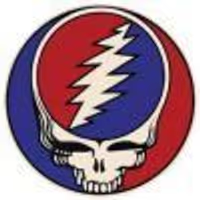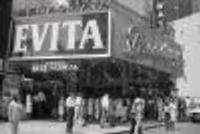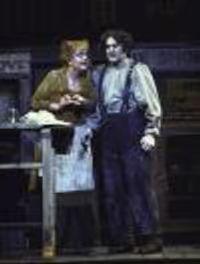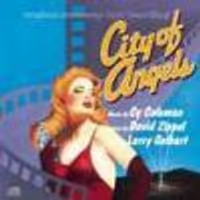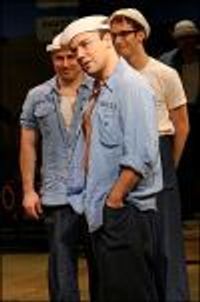Why did Urinetown close on broadway?
#1Why did Urinetown close on broadway?
Posted: 5/9/07 at 10:58pmI was wondering. I heard when I was younger and not following the world of broadway like I do now that Urinetown cloes because they were going to demolish the theatre. Is this true? Or did the the show closeing have nothing to do with the theatre getting knocked down?
#2re: Why did Urinetown close on broadway?
Posted: 5/9/07 at 11:29pmThere was a whole bunch of things that led to the Urinetown closing, yes one of them was the theatre being knocked down. Another one of them was that the show opened right after 9/11 and it had a lot of trouble finding people to market the show too. And the third thing was that sales just slowed down.
C is for Company
Broadway Legend Joined: 7/16/05
#2re: Why did Urinetown close on broadway?
Posted: 5/9/07 at 11:34pmI heard that sales were booming and they got shut out after the building became a bank, even though they planned to renovate and re-open the theater, but it would be too long for Urinetown to come back.
#3re: Why did Urinetown close on broadway?
Posted: 5/9/07 at 11:36pm
As is the case of why shows close on Broadway -- lack of ticket sales; no audience attendance.
Even with horrible reviews, producers will keep a show running on Broadway as long as ticket sales are good. TITANIC is a prime example -- the critics ripped it to shreds but the audiences kept coming and coming (plus Rosie O'Donnell's constant plugging helped quite a bit). Once ticket sales started slacking, it was put to rest.
The days of a show closing because of terrible reviews are over. If there is money to be made -- booya! Keep that puppy running as long as possible.
#4re: Why did Urinetown close on broadway?
Posted: 5/9/07 at 11:36pm
Here is the article that Playbill.com ran when Urinetown announced its closing:
http://www.playbill.com/news/article/83840.html
Based on the article, it does seem that the show primarially closed as a result of the renovations to the Henry Miller theatre. It actually did recoup its investment, which I was a little surprised to find out.
"Shut up! It's been 29 years!!!" --the incomparable Patti LuPone in her MUCH DESERVED Tony acceptance speech for Gypsy.
Kitzy's Avatar du Jour: Kitzy as Little Red Ridinghood in her college's production of "Into the Woods"
#5re: Why did Urinetown close on broadway?
Posted: 5/9/07 at 11:42pmIt wasn't doing well though. The necessity to close because of the renovations did coincide with a serious downfall in business. I was just looking up the grosses to confirm this, and they weren't good. They were fairly good for its final couple of months, but that's normal for that time of year, especially for a show with a cadre of fans that has announced its closing. But before that they were terrible, and with the likely downturn that would have occurred later in January and February, it was definitely time for it to close.
#6re: Why did Urinetown close on broadway?
Posted: 5/10/07 at 12:29am
Urinetown's business was steady and profitable for its last year on Broadway. Not sure what nobodyhome and brodyfosse are talking about.
2003 Grosses - Urinetown
#7re: Why did Urinetown close on broadway?
Posted: 5/10/07 at 12:54amThank you for providing the truth with a source, Smaxie, as opposed to a myth without a source.
-Kad
"I have also met him in person, and I find him to be quite funny actually. Arrogant and often misinformed, but still funny."
-bjh2114 (on Michael Riedel)
C is for Company
Broadway Legend Joined: 7/16/05
#9re: Why did Urinetown close on broadway?
Posted: 5/10/07 at 12:56am
I bet he used the Search Feature, too! ![]()
--http://www.benjaminadgate.com/
thtrbear
Leading Actor Joined: 10/13/06
#10re: Why did Urinetown close on broadway?
Posted: 5/10/07 at 1:44am
Those actually aren't such good grosses in that table, tho with a low nut they might be all right.
However, Urinetown did have a decent run of at least 2 years. On 9/13/2001 John Cullum was telling some fans at the stage door he didn't see how the show could run since it was unusual and 9/11 had just happened.
Moving to another theater costs a lot of money nowadays (2 or 3 moves put Purlie into the loss column even back in circa 1972, when moving probably cost less) and that would have been a big hurdle if biz wasn't great.
#11re: Why did Urinetown close on broadway?
Posted: 5/10/07 at 1:53amConsidering that those consistent grosses were the ones that allowed them to recoup their investment, obviously they were meeting their nut.
-Kad
"I have also met him in person, and I find him to be quite funny actually. Arrogant and often misinformed, but still funny."
-bjh2114 (on Michael Riedel)
#12re: Why did Urinetown close on broadway?
Posted: 5/10/07 at 2:11amIt looks as if they didn't close due to lack of ticket slase. After all they did recoupe thier losses. It looks like it has more to do with the fact that the theatre had to go and they couldn't move the show. Don't kknow if it was because it would coast too much money for it to move or if there wasn't an empty theatre open.
C is for Company
Broadway Legend Joined: 7/16/05
#13re: Why did Urinetown close on broadway?
Posted: 5/10/07 at 2:12amThere were no spaces for it available on Broadway and were forced to close. There were rumors of it coming back after, but that obviously took too long to happen.
#14re: Why did Urinetown close on broadway?
Posted: 5/10/07 at 2:59amI saw it near the end and there was a good house on a mid-week night. I'm sure it would have run longer but for the loss of their theatre. The Henry Miller's was like a construction site at that point - there was scaffolding all over the facade and even in the lobby. It actually worked well as atmosphere for Urinetown.
#15re: Why did Urinetown close on broadway?
Posted: 5/10/07 at 3:38am
I'm sorry, but those grosses don't look so good to me. Some weeks are fine, some are even excellent, but plenty aren't good. I had looked on playbill at the grosses before I posted, and I stand by what I wrote.
Starting in September, the grosses are mostly under 250K. I don't know what the weekly nut was, but this was not good business even in 2003.
Starting with the week of 9/7, we have $172,209; $206,606; $224,327; and $218,007. Then it goes up a little for a few weeks but except for one week is still under 250K, and then has a week when it's 203K. I'm sorry but those grosses are not good and are consistent with what I wrote.
It's true that earlier in the run there were weeks and sometimes a couple in a row when it went below 250K and sometimes a good deal below it, but those would be offset by more weeks that were good deal above 250K and sometimes above 300K. Starting in September it rarely hits 250K (which was probably approximately its weekly nut) until the last few weeks of the run, which coincided with the busiest time of the year. It ran another couple of weeks past that busy time and did well enough thanks to people going to see it one last time or to finally see it before it closed. Had it not been closing, more than likely the grosses would have gone down a good deal as soon as the holidays were over, as happens to most shows that are not absolute smashes at that time of year.
Updated On: 5/10/07 at 03:38 AM
#16re: Why did Urinetown close on broadway?
Posted: 5/10/07 at 3:50am
Actually the Henry Miller was like that through the entire run. That plus the decrepit interior only leant atmosphere to the show.
And yes, it closed because a move would be too expensive and there was no suitable theatre.
The show got excellent reviews and won a number of Tony Awards (including Best Book and Best Score.) It paid off by the end of its second year and was a hit in every sense of the word.
I am often baffled by the attempts of some people here to rewrite history and make flop shows out of hits or hits out of flops.
Cast albums are NOT "soundtracks."
Live theatre does not use a "soundtrack." If it did, it wouldn't be live theatre!
I host a weekly one-hour radio program featuring cast album selections as well as songs by cabaret, jazz and theatre artists. The program, FRONT ROW CENTRE is heard Sundays 9 to 10 am and also Saturdays from 8 to 9 am (eastern times) on www.proudfm.com
#17re: Why did Urinetown close on broadway?
Posted: 5/10/07 at 4:14am
"I am often baffled by the attempts of some people here to rewrite history and make flop shows out of hits or hits out of flops."
I hope you're not referring to me as someone trying to make a flop out of a hit. (And indeed you're probably not.) I loved Urinetown, and nowhere did I say it was a flop. I merely pointed out that it wasn't doing good business most weeks when it announced it was closing. I'm well aware that it paid off, and I was happy when it did. (Just clarifying for the sake of . . . clarifying, not because you said otherwise, frontrowcentre2.)
It's true that had it not had to close, it might have straggled along for a while longer. Or they might have quite wisely closed then anyway. It's smart to quite while you're ahead, even if just a little.
Indeed, if the article linked below is correct, it could have run a few more weeks. It didn't have to leave the Henry Miller's till February 15. But they closed it several weeks before that. I think that if business had been better, they probably would have run at least another couple of weeks, till closer to the eviction date. As it was, they were able to go out with several weeks with good houses.
http://web.playbill.com/news/article/82493.html
Updated On: 5/10/07 at 04:14 AM
#18re: Why did Urinetown close on broadway?
Posted: 5/10/07 at 8:31am
First of all, the Henry Miller had 630 seats during the run of Urinetown, making it Broadway's second smallest house behind the Helen Hayes. Astronomical grosses weren't possible.
Secondly, the show had a low break even - lower than you can possbly imagine - so almost every week of the run was profitable.
Thirdly, to point to the two to three weeks after Labor Day and what was the second anniversary of 9/11 as evidence that the grosses were "terrible" is a distortion. All shows cyclically take a drop after Labor Day and then recover.
The producers of Urinetown didn't produce Urinetown to make a vast fortune. They produced it because they loved it, and through smart operating, also managed to make a profit.
massofmen
Broadway Legend Joined: 12/10/04
#19re: Why did Urinetown close on broadway?
Posted: 5/10/07 at 9:30am
urinetown was amazing because it opened right after 9/11. The city needed laughter and Urinetown brought it to people.
I have heard people say that the city and its newspapers decide to give everything good reviews to try to revitilize the NY theater industry but I disagree.
This show was the little show that could. After being denied productions by over 50 regional theaters it decided to try its luck at the Fringe and I think became the only show to ever go from the Fringe to the broadway stage.
It did recoup its investment a week or 2 before it untimely closed (when the Tony winner for best musical, "Millie" didn't come close"). The producers ONLY closed it because the theater was being torn down. The operating costs were INCREDIBLY low.
The only problem I had was that the show who prided itself on being good because the product was good, started bringing in STARS to play the roles, like Tom Cavenaugh who was atrocious.
I
Jon
Broadway Legend Joined: 2/20/04
#20re: Why did Urinetown close on broadway?
Posted: 5/10/07 at 12:21pm
meanwhile, the show is now being done by hundreds of regional, college, community and even high school groups. I think it's fair to say that the authors and producers have earned some nice cash from Urinetown.
Hell, I just sent a check for a few thousand dollars to MTI for our summer production!
#21re: Why did Urinetown close on broadway?
Posted: 5/10/07 at 1:00pm
I have heard people say that the city and its newspapers decide to give everything good reviews to try to revitilize the NY theater industry but I disagree.
I disagree as well. One show that opened in that time that got a mostly deserved rough ride from critics was THOU SHALT NOT.
I do think that funnier, lighter shows were more fervently embraced. The NYT review of MAMMA MIA basically said that at this point in history Broadway neded a feel-good show.
And, Nobodyhome, I wasn't refrring to you are anyone specifically. But if you check the overall average sales of URINTOWN it was consistently above 80% - enough to enure that most weeks it was profitable. A move to a larger theaer would have increased operating costs.
But there is tendency of some people to take a show thay dislike and make an assumption that if it only had a short run it didn't pay off. Asw we know DROWSY paid off within 6 months so even if it closed now with less than 500 perfs it would still be a hit.
Cast albums are NOT "soundtracks."
Live theatre does not use a "soundtrack." If it did, it wouldn't be live theatre!
I host a weekly one-hour radio program featuring cast album selections as well as songs by cabaret, jazz and theatre artists. The program, FRONT ROW CENTRE is heard Sundays 9 to 10 am and also Saturdays from 8 to 9 am (eastern times) on www.proudfm.com
#22re: Why did Urinetown close on broadway?
Posted: 5/10/07 at 1:42pmI talked to one of the original cast members and he said that it was because sales were dropping near the end of the run. So when the decision came to tear down the theatre - they just decided to end the run.
Broadway Star Joined: 12/31/69
#23re: Why did Urinetown close on broadway?
Posted: 5/10/07 at 2:32pm
I have to comment on this:
"The days of a show closing because of terrible reviews are over. If there is money to be made -- booya! Keep that puppy running as long as possible."
No show has ever closed for 'bad reviews.' Sometimes, if the reviews are bad and ticket sales are weak, a producer will decide that it's not worth continuing, but it's only because they do not expect ticket sales to increase.
No show has ever been selling plenty of tickets and then closed because of bad reviews. If they did, Wicked would have run a week.
ghostlight2
Broadway Legend Joined: 12/5/04
#24re: Why did Urinetown close on broadway?
Posted: 5/10/07 at 3:24pm
"Moving to another theater costs a lot of money nowadays (2 or 3 moves put Purlie into the loss column even back in circa 1972, when moving probably cost less) and that would have been a big hurdle if biz wasn't great."
How do you explain the success of Chicago, then, thtrbear? ![]()
"But if you check the overall average sales of URINTOWN it was consistently above 80% - enough to enure that most weeks it was profitable."
80% attendance sounds great on the face of it, but the real number to look at is the average ticket price. It doesn't matter if the theatre is at 100% capacity if most of the tickets are half-priced or even papered. (I'm not saying that this was the case with Urinetown).
"Secondly, the show had a low break even - lower than you can possbly imagine - so almost every week of the run was profitable." People keep saying this. Why was the break-even so low?
Videos


